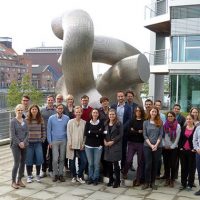 Last week, on October 08-09, I took part in a workshop at the University of Duisburg’s Kate Hamburger Kolleg (Centre for Global Cooperation Research) named “Translation in World Politics”. It was very pleasing to see the ideas of policy translation making headway in other disciplines, and now also in International Relations and World Politics. I want to tell “thank you” to organizers of the workshop – Dr. Alejandro Esguera and Dr. Tobias Berger for organizing such a wonderful event, and for inviting me from so far to take part in it. It’s been fantastic…
Last week, on October 08-09, I took part in a workshop at the University of Duisburg’s Kate Hamburger Kolleg (Centre for Global Cooperation Research) named “Translation in World Politics”. It was very pleasing to see the ideas of policy translation making headway in other disciplines, and now also in International Relations and World Politics. I want to tell “thank you” to organizers of the workshop – Dr. Alejandro Esguera and Dr. Tobias Berger for organizing such a wonderful event, and for inviting me from so far to take part in it. It’s been fantastic…
Thus, it’s now official. Policy Translation made it to International Relations. In a two-day workshop on 08-09 October, a number of prominent scholars from the UK and Germany (and one not so prominent scholar from Azerbaijan) discussed theory, methods and empirical application of the ideas of “translation” various social phenomena in politics. The highlight of the event was the key-note speech by Professor Richard Freeman from the University of Edinburgh. Professor Freeman applied ideas from Hanna Arendt’s book “The Human Condition” to analyzing politics via studying an encounter of Henry Kissinger and his Chinese counter-part Chou. It’s a new form of political analysis when events and meetings come to forefront, often in an ethnographic light. I was lucky to see Richard’s presentation of John Dewey’s thought in Tilburg in 2012, and I must say that there is some magic in the manner with which he interprets the great minds to help us make sense of their relevance in politics.
As part of the workshop, I presented a concept note on policy translation advancing seven themes around which the scholarship of policy translation rotates, blending these with examples from my own work in Azerbaijan and Kazakhstan (what I call the world periphery). If interested, I can send you my paper via email.
Here is a link to the description of the event prepared by the centre, including the photos and the programme.